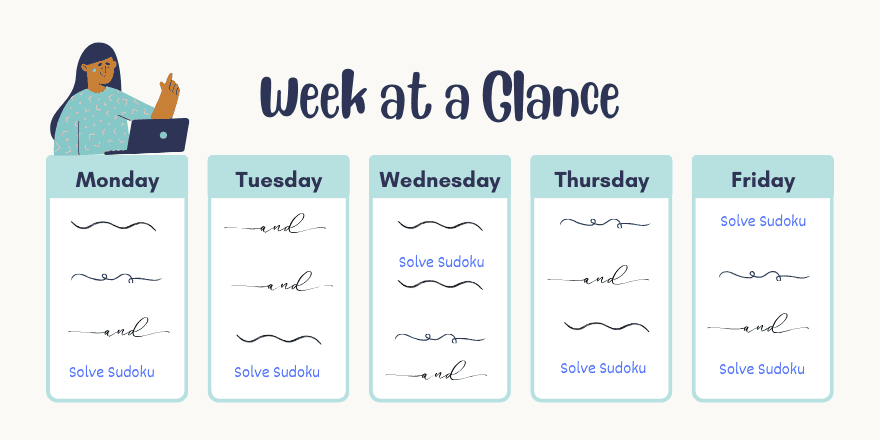Table of Contents
- Introduction
- The Science Behind Sudoku and Stress Relief
- How Sudoku Promotes Mindfulness and Focus
- The Therapeutic Effects of Logical Thinking
- A Screen-Free, Healthy Escape from Daily Stress
- Sudoku as a Daily Relaxation Ritual
- Expert Tips: Making Sudoku a Stress-Busting Habit
- Conclusion: Relax, Solve, and Enjoy
- FAQs
1. Introduction
Ever feel like your brain is stuck in overdrive? Life throws a lot at us—deadlines, responsibilities, the constant buzz of notifications. If you’re looking for a simple, stress-free way to unwind, Sudoku might just be your new best friend. This classic number puzzle isn’t just about logic—it’s a secret weapon for relaxation. Experts agree that engaging in a focused, calming activity like Sudoku can work wonders for mental well-being. But how exactly does filling in a grid of numbers help you de-stress? Let’s break it down.
2. The Science Behind Sudoku and Stress Relief
Stress has a sneaky way of creeping into our daily lives, spiking cortisol levels and leaving us feeling drained. But here’s the good news: research suggests that mentally stimulating activities, like Sudoku, can lower stress hormones while keeping your brain engaged. Learn more about the research here.
When you focus on solving a puzzle, your brain enters a state similar to meditation. Your thoughts slow down, distractions fade, and a sense of calm takes over. Scientists call this the “flow state”—a mental zone where you’re completely immersed in an activity. Sudoku provides just the right balance of challenge and reward, keeping your mind occupied without overwhelming it.
3. How Sudoku Promotes Mindfulness and Focus
Ever notice how your mind drifts when you’re anxious? Worries pile up, and suddenly, you’re spiraling into worst-case scenarios. Sudoku interrupts that cycle.
When you’re solving a puzzle, you’re completely present. You’re not stressing over tomorrow’s to-do list or replaying awkward conversations from last week. Instead, you’re focused on one thing: finding the right number for that empty box. This level of concentration mirrors mindfulness meditation, where being in the moment is key. The more you practice, the easier it becomes to quiet mental chatter—both on and off the grid.
4. The Therapeutic Effects of Logical Thinking
Sudoku isn’t just about numbers; it’s about patterns, logic, and problem-solving. Engaging in structured thinking helps organize your thoughts, making you feel more in control. When life feels chaotic, sitting down with a Sudoku puzzle offers a sense of order.
Each completed row or column gives you a mini dopamine boost—the brain’s way of rewarding you for solving a problem. This small but powerful sense of accomplishment can shift your mindset, replacing stress with satisfaction. Plus, Sudoku helps strengthen cognitive skills like memory, concentration, and analytical thinking—all of which contribute to overall mental clarity.
5. A Screen-Free, Healthy Escape from Daily Stress
These days, screens are everywhere. Between emails, social media, and endless scrolling, our brains rarely get a break. Sudoku offers a refreshing alternative—a chance to unplug and engage in a low-tech, stress-relieving activity.
Solving a puzzle on paper can be especially calming. There’s something satisfying about physically writing numbers, flipping a page, and working through a challenge without digital distractions. And if you prefer digital Sudoku? No problem. Just be mindful of blue light exposure before bedtime, as it can interfere with sleep quality.

6. Sudoku as a Daily Relaxation Ritual
Stress relief works best when it’s consistent. Instead of treating Sudoku as an occasional escape, why not make it part of your daily routine?
Play a puzzle while sipping your morning coffee. Solve one during a lunch break. Unwind with a game before bed. By incorporating Sudoku into your daily habits, you create a built-in stress buffer—something that signals to your brain that it’s time to relax.

7. Expert Tips: Making Sudoku a Stress-Busting Habit
Want to maximize Sudoku’s relaxation benefits? Here’s how the pros do it:
- Don’t rush. Treat Sudoku as a leisurely activity, not a race. The goal is to enjoy the process.
- Find your sweet spot. Choose a difficulty level that challenges you but doesn’t frustrate you.
- Pair it with relaxation. Play with calming background music, a warm drink, or even some scented candles.
- Make it social. Compete with friends, join Sudoku forums, or discuss strategies with fellow enthusiasts. Shared experiences can make it even more enjoyable.
8. Conclusion: Relax, Solve, and Enjoy
At the end of the day, Sudoku isn’t just a game—it’s a tool for mental relaxation. By engaging in focused, logical thinking, you give your brain a much-needed break from stress and chaos. Whether you play on paper or a screen, Sudoku provides a structured yet soothing escape. So, the next time life feels overwhelming, grab a puzzle, take a deep breath, and let the numbers work their magic.
9. FAQs
1. Can Sudoku really help with anxiety and stress?
Absolutely! Sudoku engages the brain in a way that promotes mindfulness, focus, and relaxation, making it an effective stress reliever.
2. How long should I play Sudoku for relaxation?
Even 10–15 minutes a day can help lower stress levels and improve cognitive function.
3. Is Sudoku better on paper or digitally for stress relief?
Both have benefits! Paper Sudoku reduces screen time, while digital Sudoku offers convenience. Choose what feels best for you.
4. Does Sudoku improve mental health in the long run?
Yes! Regular Sudoku play strengthens cognitive skills, enhances memory, and promotes a calmer, more focused mind.
5. What difficulty level should I choose for relaxation?
Stick to a level that keeps you engaged without causing frustration. Medium difficulty is often a great balance for stress relief.
